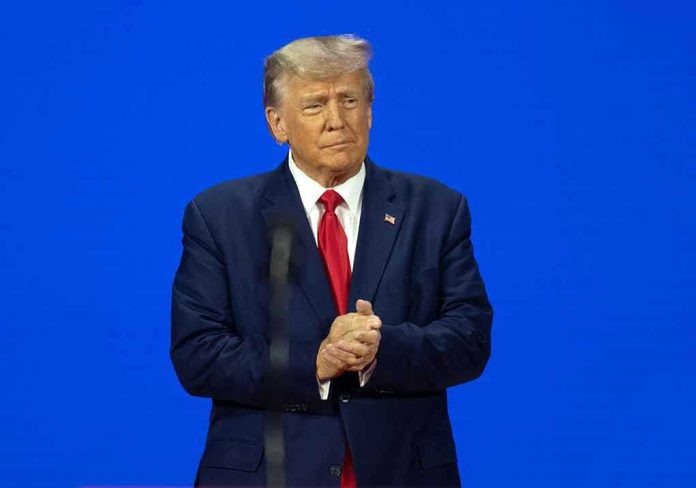
Donald Trump’s demand for a DOJ investigation into Bill Clinton and other Democrats linked to Epstein emails is stirring political controversy.
Story Overview
- Trump urges DOJ to investigate Clinton and Democrats named in Epstein emails.
- Criticism of Republicans supporting the release of Epstein-related documents.
- Renewed debate over Epstein case handling and political accountability.
- Potential implications for political figures and public trust in institutions.
Trump’s Demand for a DOJ Probe
Former President Donald Trump has called for the Department of Justice to investigate Bill Clinton and other Democrats whose names appeared in newly unsealed documents related to the Jeffrey Epstein case. Trump argues that the release of these documents was politically motivated to damage his political rivals. His criticism extends to “weak Republicans” who supported the release, suggesting they are unwittingly aiding their political opponents by endorsing the transparency that could harm their party.
These unsealed documents have reignited interest in the Epstein case, which has been a point of contention and speculation since Epstein’s arrest and subsequent death in jail in 2019. Trump’s demands echo his strategy of leveraging scandals to discredit opponents, a tactic he has used throughout his political career. This latest move has sparked renewed debates over legal accountability, transparency, and the potential politicization of criminal investigations.
The Epstein Case and Political Ramifications
The Epstein case, infamous for its connections to high-profile individuals, continues to be a flashpoint in discussions about elite impunity and political corruption. Epstein’s 2008 plea deal, his 2019 arrest, and untimely death have only added to the intrigue and controversy surrounding his network. The recent unsealing of court documents has brought back into the spotlight the names of political figures, including that of former President Bill Clinton, heightening public interest and media scrutiny.
While Trump has used this development to call for further investigation, the response from Democrats has been defensive. Clinton’s spokesperson has denied any wrongdoing, emphasizing that Clinton never visited Epstein’s private island, a location frequently cited in conspiracy theories. This opposition reflects the broader political divide over the issue, with Republicans split on the benefits of transparency versus the potential for partisan damage.
Political and Legal Implications
The fallout from Trump’s statements and the unsealed documents could have significant short-term and long-term implications. Politically, it intensifies scrutiny on individuals named in the documents and raises questions about the handling of the Epstein investigation. Legally, there is potential for formal investigations by the DOJ or Congressional hearings, although no such actions have been announced as of yet.
The implications extend to the Republican Party, where internal divisions have surfaced over Trump’s aggressive posture and the broader question of transparency. The potential impact on the 2024 election cycle could be profound, affecting party alignments and candidate strategies. For the public, this situation further compounds skepticism towards political elites and the justice system, issues that have been exacerbated by the Epstein saga.
Expert Opinions and Broader Impact
Legal experts caution against the politicization of criminal investigations, emphasizing the necessity of due process. Political analysts observe Trump’s strategy as a means to galvanize his base while diverting attention from his own legal challenges. Victim advocates, while supportive of transparency, warn against exploiting victims’ stories for political gain, stressing the need for genuine accountability and justice.
The media’s role in shaping the narrative is critical, with investigative journalism spotlighting the intricacies of the Epstein case and its broader societal implications. This renewed focus on Epstein underscores the enduring power of his story to captivate and divide public opinion, as well as its potential to influence future legal and political developments.
Sources:
The New York Times, “Jeffrey Epstein’s Rolodex: Unsealed Documents Reveal New Details” (Jan 2024)
CNN, “Trump Calls for DOJ Probe of Clinton Over Epstein Files” (Jan 2024)
BBC News, “Jeffrey Epstein: Timeline of Sex Trafficking Case” (2023)
Politico, “Republicans Split Over Epstein Document Release” (Jan 2024)







